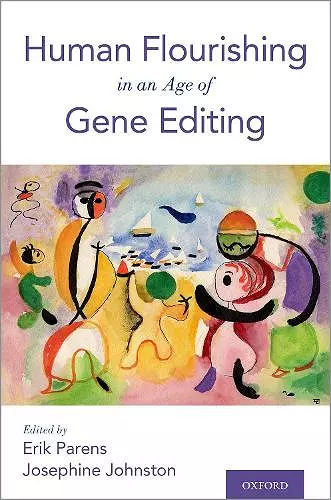Human Flourishing in an Age of Gene Editing
Erik Parens editor Josephine Johnston editor
Format:Paperback
Publisher:Oxford University Press Inc
Published:9th Oct '19
Currently unavailable, and unfortunately no date known when it will be back

International uproar followed the recent announcement of the birth of twin girls whose genomes had been edited with a breakthrough DNA editing-technology. This technology, called clustered regularly interspaced short palindrome repeats or CRISPR-Cas9, can alter any DNA, including DNA in embryos, meaning that changes can be passed to the offspring of the person that embryo becomes. Should we use gene editing technologies to change ourselves, our children, and future generations to come? The potential uses of CRISPR-Cas9 and other gene editing technologies are unprecedented in human history. By using these technologies, we eradicate certain dreadful diseases. Altering human DNA, however, raises enormously difficult questions. Some of these questions are about safety: Can these technologies be deployed without posing an unreasonable risk of physical harm to current and future generations? Can all physical risks be adequately assessed, and responsibly managed? But gene editing technologies also raise other moral questions, which touch on deeply held, personal, cultural, and societal values: Might such technologies redefine what it means to be healthy, or normal, or cherished? Might they undermine relationships between parents and children, or exacerbate the gap between the haves and have-nots? The broadest form of this second kind of question is the focus of this book: What might gene editing--and related technologies--mean for human flourishing? In the new essays collected here, an interdisciplinary group of scholars asks age--old questions about the nature and well-being of humans in the context of a revolutionary new biotechnology--one that has the potential to change the genetic make-up of both existing people and future generations. Welcoming readers who study related issues and those not yet familiar with the formal study of bioethics, the authors of these essays open up a conversation about the ethics of gene editing. It is through this conversation that citizens can influence laws and the distribution of funding for science and medicine, that professional leaders can shape understanding and use of gene editing and related technologies by scientists, patients, and practitioners, and that individuals can make decisions about their own lives and the lives of their families.
The book starts with a bang, an impassioned and beautifully written essay by Rosemarie Garland-Thompson, the disability studies pioneer, who tells her tale of flourishing despite — indeed in part because of — the genetic condition with which she was born and has lived. It is a compelling firstperson narrative. As a collection, the essays aim to move beyond technical genetic fixes to the human genome, and examine whether interventions at the genetic, individual, or social levels are most appropriate for enabling human flourishing. They address "how should we think about it," rather than prescribe policy solutions. * Robert Cook-Deegan, Arizona State University, Issues in Science and Technology *
I should stress [...] that each chapter is self-standing, and may be read independently of the others. But my guess is that you will become rapidly aware of the global coherence of the work, and that you will end up with no part of it left unread ... * François Nau, Université de Poitiers, ESSAT News and Reviews *
ISBN: 9780190940362
Dimensions: 155mm x 231mm x 18mm
Weight: 408g
288 pages